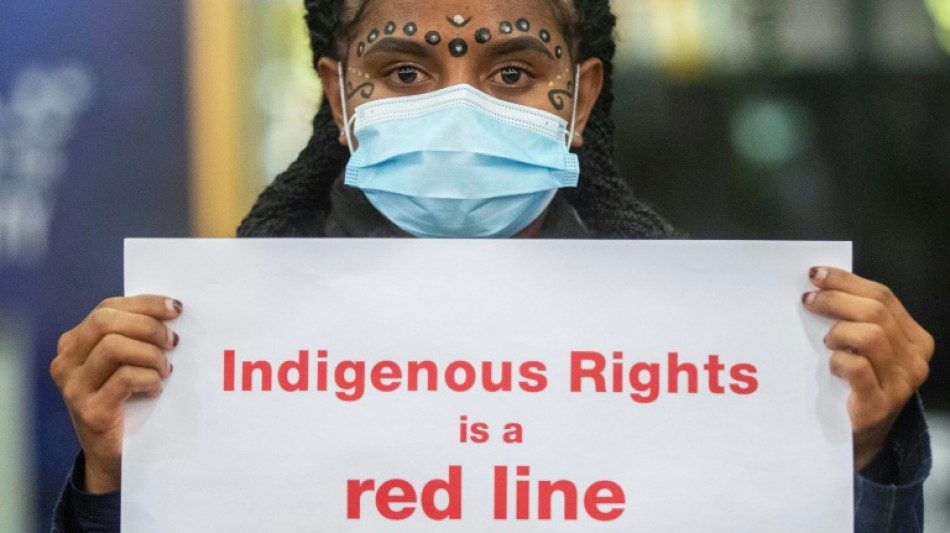
-
 Hungry Sabalenka ready for more Slam success
Hungry Sabalenka ready for more Slam success
-
Mass jailbreak in Mozambique amid post-election unrest

-
 Azerbaijani jet crashes in Kazakhstan, killing 38
Azerbaijani jet crashes in Kazakhstan, killing 38
-
Bridges outduels Wembanyama as Knicks beat Spurs

-
 2004 Indian Ocean tsunami: what to know 20 years on
2004 Indian Ocean tsunami: what to know 20 years on
-
Asia to mourn tsunami dead with ceremonies 20 years on

-
 Syrians protest after video of attack on Alawite shrine
Syrians protest after video of attack on Alawite shrine
-
Russian state owner says cargo ship blast was 'terrorist attack'

-
 38 dead as Azerbaijani jet crashes in Kazakhstan
38 dead as Azerbaijani jet crashes in Kazakhstan
-
Crisis-hit Valencia hire West Brom's Corberan as new boss

-
 Suriname ex-dictator and fugitive Desi Bouterse dead at 79
Suriname ex-dictator and fugitive Desi Bouterse dead at 79
-
35 feared dead as Azerbaijani jet crashes in Kazakhstan

-
 Pope calls for 'arms to be silenced' in Christmas appeal
Pope calls for 'arms to be silenced' in Christmas appeal
-
Syria authorities say torched 1 million captagon pills

-
 Pope calls for 'arms to be silenced' across world
Pope calls for 'arms to be silenced' across world
-
32 survivors as Azerbaijani jet crashes in Kazakhstan

-
 Pakistan air strikes kill 46 in Afghanistan, Kabul says
Pakistan air strikes kill 46 in Afghanistan, Kabul says
-
Liverpool host Foxes, Arsenal prepare for life without Saka

-
 Japan FM raises 'serious concerns' over China military buildup
Japan FM raises 'serious concerns' over China military buildup
-
Pope's sombre message in Christmas under shadow of war

-
 Zelensky condemns Russian 'inhumane' Christmas attack on energy grid
Zelensky condemns Russian 'inhumane' Christmas attack on energy grid
-
Sweeping Vietnam internet law comes into force

-
 Pope kicks off Christmas under shadow of war
Pope kicks off Christmas under shadow of war
-
Catholics hold muted Christmas mass in Indonesia's Sharia stronghold

-
 Japan's top diplomat in China to address 'challenges'
Japan's top diplomat in China to address 'challenges'
-
Thousands attend Christmas charity dinner in Buenos Aires

-
 Demand for Japanese content booms post 'Shogun'
Demand for Japanese content booms post 'Shogun'
-
As India's Bollywood shifts, stars and snappers click

-
 Mystery drones won't interfere with Santa's work: US tracker
Mystery drones won't interfere with Santa's work: US tracker
-
Djokovic eyes more Slam glory as Swiatek returns under doping cloud

-
 Australia's in-form Head confirmed fit for Boxing Day Test
Australia's in-form Head confirmed fit for Boxing Day Test
-
Brazilian midfielder Oscar returns to Sao Paulo

-
 'Wemby' and 'Ant-Man' to make NBA Christmas debuts
'Wemby' and 'Ant-Man' to make NBA Christmas debuts
-
US agency focused on foreign disinformation shuts down

-
 On Christmas Eve, Pope Francis launches holy Jubilee year
On Christmas Eve, Pope Francis launches holy Jubilee year
-
'Like a dream': AFP photographer's return to Syria

-
 Chiefs seek top seed in holiday test for playoff-bound NFL teams
Chiefs seek top seed in holiday test for playoff-bound NFL teams
-
Panamanians protest 'public enemy' Trump's canal threat

-
 Cyclone death toll in Mayotte rises to 39
Cyclone death toll in Mayotte rises to 39
-
Ecuador vice president says Noboa seeking her 'banishment'

-
 Leicester boss Van Nistelrooy aware of 'bigger picture' as Liverpool await
Leicester boss Van Nistelrooy aware of 'bigger picture' as Liverpool await
-
Syria authorities say armed groups have agreed to disband

-
 Maresca expects Man City to be in title hunt as he downplays Chelsea's chancs
Maresca expects Man City to be in title hunt as he downplays Chelsea's chancs
-
Man Utd boss Amorim vows to stay on course despite Rashford row

-
 South Africa opt for all-pace attack against Pakistan
South Africa opt for all-pace attack against Pakistan
-
Guardiola adamant Man City slump not all about Haaland

-
 Global stocks mostly higher in thin pre-Christmas trade
Global stocks mostly higher in thin pre-Christmas trade
-
Bethlehem marks sombre Christmas under shadow of war

-
 NASA probe makes closest ever pass by the Sun
NASA probe makes closest ever pass by the Sun
-
11 killed in blast at Turkey explosives plant


Things to know about a landmark biodiversity agreement
After years of negotiations, the world has agreed a landmark deal to protect vanishing species and ecosystems, dubbed a "peace pact with nature" at the UN meeting in Montreal called COP15.
Here are some of its strengths, as well as where it fell short.
- '30 by 30' -
The cornerstone of the agreement is the so-called 30 by 30 goal -- a pledge to protect 30 percent of the world's land and seas by 2030.
Currently, only about 17 percent of land and seven percent of oceans are protected. The oceans target had reportedly been opposed by some countries but made it into the final text.
And some experts had said 30 percent is a low aim, insisting that protecting 50 percent would be better.
- Indigenous rights -
About 80 percent of the Earth's remaining biodiverse land is currently managed by Indigenous people, and it's broadly recognized that biodiversity is better respected on Indigenous territory.
Activists wanted to make sure their rights are not trampled in the name of conservation -- previous efforts to safeguard land have seen Indigenous communities marginalized or displaced in what has been dubbed "green colonialism."
In the end, Indigenous rights were addressed throughout the text, including in areas covered by the 30 by 30 pledge -- safeguarding Indigenous peoples' right to remain stewards of land they use and ensuring they are not subject to mass evictions.
The International Indigenous Forum on Biodiversity praised the text for its "strong language on respect for the rights of Indigenous Peoples and local communities."
- Finance -
Finance remained the overriding question.
Developing countries say developed nations grew rich by exploiting their resources and the South should be paid to preserve its ecosystems.
In the end, the text approves the objective for rich countries to provide "at least US$20 billion per year by 2025, and ... at least US$30 billion per year by 2030," approximately double and then triple the current international aid for biodiversity.
It also includes new language that mentions funding from "developed countries, and from countries that voluntarily assume obligations of developed country parties," which a Western source told AFP was meant to involve the United States.
Washington is not formally a part of the Convention on Biological Diversity but supportive of its goals.
Developing countries were also seeking a new funding mechanism, as a signal of the rich world's commitment to this goal, but developed nations said it would take several years to create.
In the end, a halfway solution was adopted: creating a "trust fund" within an existing financial mechanism called the Global Environment Facility, as a stepping stone to a new fund in the future.
- What was missing -
An overriding concern by campaigners was that the final text did not contain enough "milestones" -- key statistical measures countries should achieve before the year 2050.
For example, the text says human-induced extinction of known threatened species is halted, and, by 2050, extinction rate and risk of all species are reduced tenfold -- but there aren't targets that countries must hit before that year.
Also watered down was a mandate for businesses to assess and report on the biodiversity impacts -- instead they are merely "encouraged" to do so.
A.Malone--AMWN


